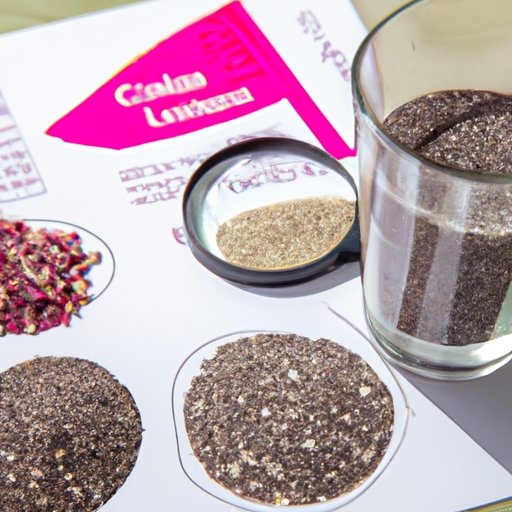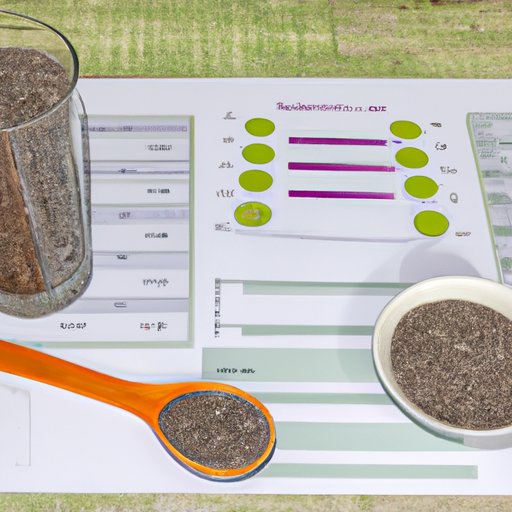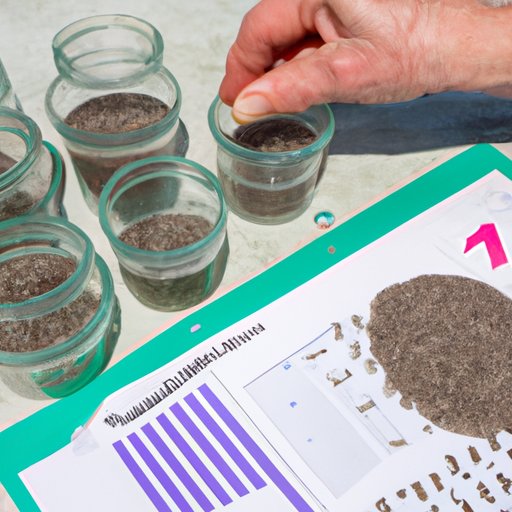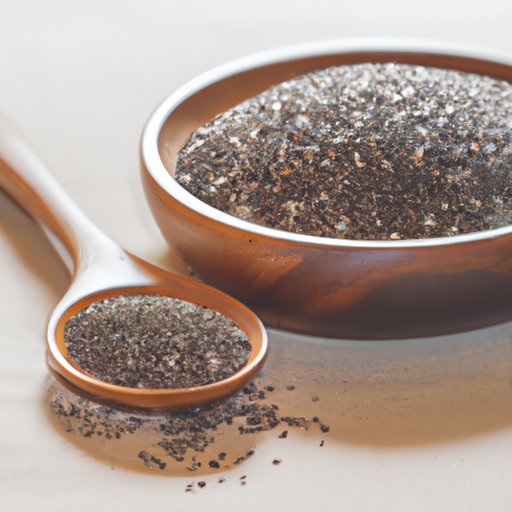Introduction
Chia seeds have become increasingly popular in recent years due to their impressive nutritional profile and purported health benefits. But are these tiny seeds really as healthy as they seem? In this article, we’ll explore the potential health benefits and risks of consuming chia seeds and provide recommendations on how to safely incorporate them into a balanced diet.
Exploring the Health Benefits of Chia Seeds
Chia seeds are an excellent source of omega-3 fatty acids, antioxidants, fiber, and other essential nutrients. Here’s a closer look at some of the potential health benefits of consuming chia seeds:
Omega-3 Fatty Acids
Chia seeds are one of the richest plant sources of omega-3 fatty acids, which play an important role in maintaining heart health, regulating inflammation, and promoting brain development. According to a study published in the Journal of Food Science and Technology, chia seeds contain up to 60% alpha-linolenic acid (ALA), which is an essential omega-3 fatty acid that the body cannot produce on its own.
Antioxidants
Chia seeds are also packed with antioxidants, which can help protect your cells from oxidative damage caused by free radicals. In fact, a study published in the European Journal of Nutrition found that chia seeds have higher antioxidant activity than other popular superfoods like flaxseeds, hemp seeds, and sesame seeds.
Fiber
Chia seeds are an excellent source of dietary fiber, which is important for digestion, weight management, and healthy blood sugar levels. According to a study published in the International Journal of Food Sciences and Nutrition, just two tablespoons of chia seeds provide 11 grams of dietary fiber—that’s 44% of the recommended daily intake.
Examining the Potential Downsides of Eating Chia Seeds
While chia seeds offer numerous health benefits, there are some potential downsides to consider. Here’s a look at some of the potential risks associated with eating chia seeds:
High Calorie Content
Chia seeds are high in calories and fat, so it’s important to monitor portion sizes. Two tablespoons of chia seeds contain 138 calories and 9 grams of fat—nearly 20% of the recommended daily value.
Digestive Issues
Due to their high fiber content, chia seeds may cause digestive issues such as bloating, gas, and constipation if consumed in large amounts. To avoid any unpleasant side effects, it’s best to start with small amounts and gradually increase your intake over time.
Allergies
Some people may be allergic to chia seeds, particularly those who are sensitive to other members of the mint family. If you experience any symptoms such as itching, swelling, or difficulty breathing after eating chia seeds, it’s important to seek medical attention right away.
Comparing Chia Seeds to Other Superfoods
Chia seeds are often compared to other popular superfoods like flaxseeds, hemp seeds, and sesame seeds. Here’s a closer look at how these four superfoods stack up in terms of nutritional value, cost, and availability:
Nutritional Value
All four superfoods are rich in essential nutrients like omega-3 fatty acids, antioxidants, and fiber. However, chia seeds have the highest concentrations of these nutrients and are considered the most nutrient-dense of the four.
Cost
Chia seeds tend to be more expensive than other superfoods, but they are still relatively affordable. A 16-ounce bag of chia seeds typically costs around $10, while a pound of sesame seeds costs around $5 and a pound of hemp seeds costs around $7.
Availability
Chia seeds are widely available in grocery stores, health food stores, and online retailers. They can also be purchased in bulk, which is a great way to save money. Flaxseeds, hemp seeds, and sesame seeds are also widely available in similar locations.

Investigating the Nutritional Value of Chia Seeds
In addition to their impressive amount of omega-3 fatty acids, antioxidants, and fiber, chia seeds are also a good source of several vitamins and minerals. Here’s a closer look at the macronutrients and micronutrients found in chia seeds:
Macronutrients
Two tablespoons of chia seeds contain 138 calories, 9 grams of fat, 12 grams of carbohydrates, and 4 grams of protein.
Vitamins and Minerals
Chia seeds are also a good source of several vitamins and minerals, including calcium, magnesium, phosphorus, zinc, manganese, and vitamins B1, B2, and B3.

Analyzing the Role of Chia Seeds in a Balanced Diet
Chia seeds can be a beneficial addition to a balanced diet, as long as they are consumed in moderation. Here’s a look at some of the potential benefits of incorporating chia seeds into your diet:
Weight Management
Chia seeds are high in fiber, which can help promote fullness and reduce cravings. This can make it easier to stick to a healthy diet and maintain a healthy weight.
Heart Health
The omega-3 fatty acids found in chia seeds can help lower cholesterol levels, reduce inflammation, and improve circulation, all of which can benefit heart health.
Blood Sugar Control
Chia seeds are low in carbohydrates and high in fiber, which can help regulate blood sugar levels and prevent spikes in blood sugar.

Evaluating the Safety of Chia Seeds for Specific Populations
While chia seeds can be a nutritious addition to a balanced diet, there are certain populations that should exercise caution when consuming them. Here’s a look at some of the potential risks for children, pregnant women, and people with existing medical conditions:
Children
Chia seeds are not recommended for children under the age of two due to their high fiber content, which can interfere with the absorption of essential nutrients. Once children reach the age of two, they can consume small amounts of chia seeds as part of a balanced diet.
Pregnant Women
It’s important for pregnant women to consult with their healthcare provider before consuming chia seeds, as they may interfere with the absorption of certain medications. Additionally, pregnant women should limit their consumption of chia seeds to no more than two tablespoons per day.
People With Existing Medical Conditions
People with existing medical conditions should talk to their healthcare provider before consuming chia seeds, as they may interact with certain medications. Additionally, people with diabetes should monitor their blood sugar levels closely when consuming chia seeds, as they can affect blood sugar levels.
Conclusion
Chia seeds are an excellent source of essential nutrients like omega-3 fatty acids, antioxidants, and fiber. They can be a beneficial addition to a balanced diet, as long as they are consumed in moderation. However, certain populations should exercise caution when consuming chia seeds, as they may interfere with the absorption of certain medications or affect blood sugar levels. Ultimately, it’s best to consult with your healthcare provider before incorporating chia seeds into your diet.
(Note: Is this article not meeting your expectations? Do you have knowledge or insights to share? Unlock new opportunities and expand your reach by joining our authors team. Click Registration to join us and share your expertise with our readers.)
